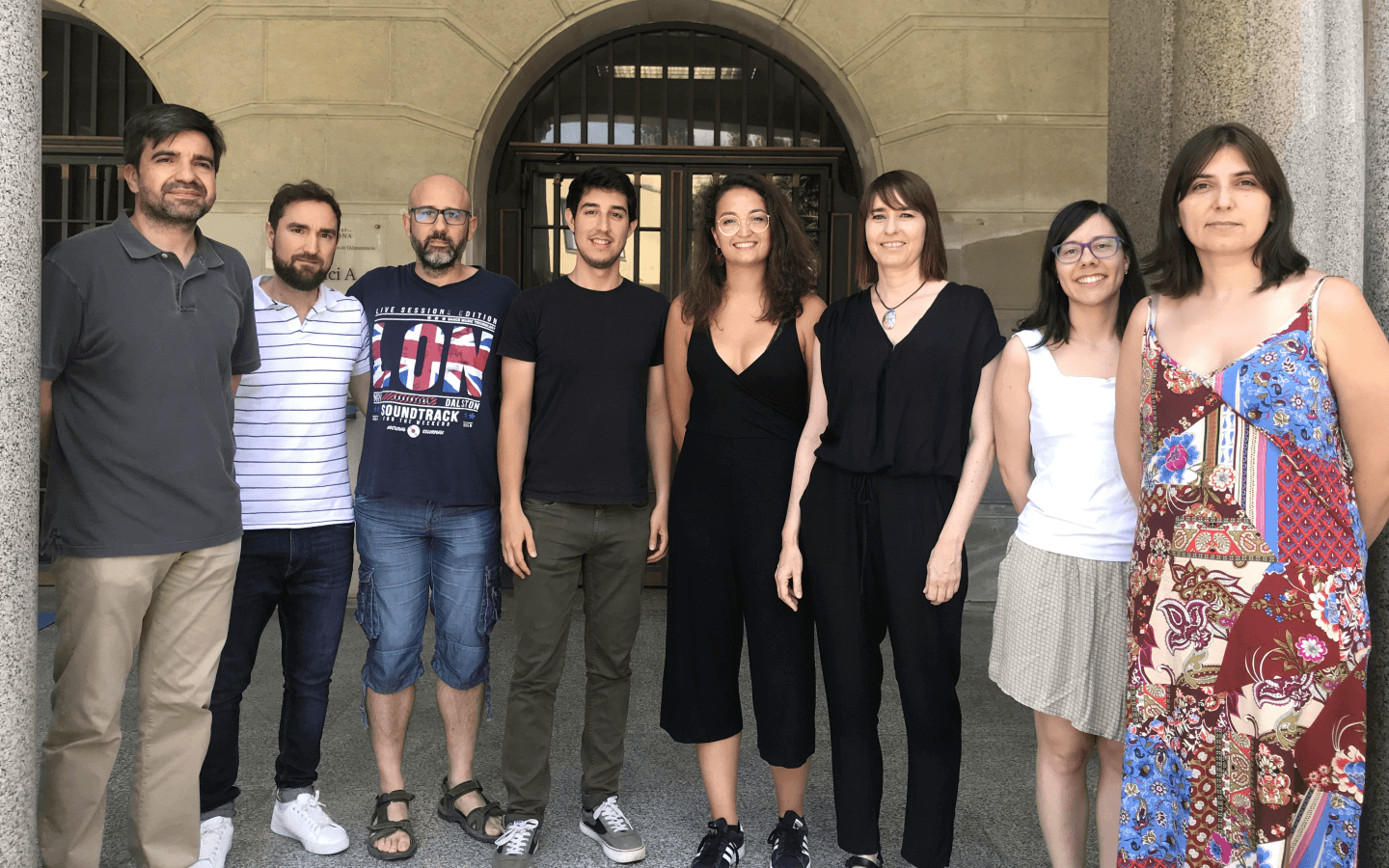Pharmacological targets in inflammation and metabolic diseases
Research Program
Leaders
Where we are
 Institut de Biomedicina de la UB (IBUB)
Institut de Biomedicina de la UB (IBUB)
Related websites
Low-intensity chronic inflammation is responsible for many diseases including insulin resistance and certain heart muscle diseases. Investigating new molecular mechanisms implicated in this process could lead to new pharmacological targets to prevent or reduce the impact of these conditions. More specifically, our group aims to investigate the involvement of peroxisomal proliferator-activated receptor (PPAR)beta/delta agonists, AMP-activated protein kinase activators and oleic acid on these pathways in preventing low-intensity chronic inflammation and its associated pathologies.
Our primary aim is to identify new pharmacological targets that would rupture this link between inflammation and diseases such as insulin resistance and heart muscle disease.
We form part of the Centre for Biomedical Network Research on Diabetes and Associated Metabolic Diseases (CIBERDEM) and are a recognised research group by Government of Catalonia (2017SGR-124).
Research lines
- The study of new mechanisms by which PPARbeta/delta agonists reduce inflammation and insulin resistance.
- The evaluation of new pharmacological targets for the prevention of diabetic heart muscle disease.
- Research on new pharmacological targets for the treatment and prevention of diabetic heart muscle disease in animal type 1 diabetes mellitus models.
- The evaluation of new pharmacological targets involved in the development of diabetes and the potential to develop new medicines to treat diabetes.
- The study of the mechanisms involved in the low birth weight caused by endoplasmic reticulum stress on the placenta.
Scientific objectives
- To develop heme-regulated inhibitor (HRI) activator medicines to increase hepatic and serum fibroblast growth factor 21 (FGF21) levels for the treatment of metabolic diseases.
- To evaluate the effects of PPARb/d agonists in preventing diabetic heart disease.
- To establish new determinants connecting inflammation with insulin resistance.
- To establish a possible association between FGF21 and endoplasmic reticulum stress and low birth weight.
Area/Field of expertise
Our area of expertise is pharmacological biochemistry in inflammation and insulin resistance.
Our methodology includes the conduct of in vivo and in vitro studies. We have expertise in the use of various in vivo models (obesity and insulin resistance models induced by fat or fructose diet; animal heart disease models with over-expression of TNFα in the heart). We use these to investigate glucose intolerance, fatty liver (liver triglyceride levels, Oil-Red O and eosin-haematoxylin staining, immunohistochemistry), cardiac hypertrophy (echocardiography, immunohistochemistry), inflammation (expression of inflammatory cytokines in tissues, DNA binding activity of NF-κB and other proinflammatory transcription factors, protein levels) and metabolites (diacylglycerol, ceramides).
We have also gained extensive experience in in vitro studies with various mouse (myotubes, cardiomyocytes, hepatocytes and adipocytes) and human cell lines (skeletal muscle cells, adipocytes, cardiomyocytes and hepatocytes) as well as in the study of primary cultures. In these cultures, we analyse fatty acid oxidation, glucose uptake, microRNA, inflammatory markers, adipokines and endoplasmic reticulum stress markers. We have also conducted gene silencing using small interfering RNA or gene over-expression.

Group members
-

Investigador post-doc
-

Investigador
-

Jefe de Grupo Senior
Last Publications
- Rostami A, Palomer X, Pizarro J, Peña L, MATIAS ZAMORA RODRÍGUEZ, Montori M, Barroso E, Valenzuela-Alcaraz BI, Crispi F, Salvador JM, García R, Hurlé MA, Nistal F and Vazquez M GADD45A suppression contributes to cardiac remodeling by promoting inflammation, fibrosis and hypertrophy. CELLULAR AND MOLECULAR LIFE SCIENCES . 82(1): 189-189.
- Girona J, Guardiola M, Barroso E, García-Altares M, Ibarretxe D, Plana N, Ribalta J, Amigó N, Correig X, Vazquez M, Masana L and Rodríguez-Calvo R GDF15 Circulating Levels Are Associated with Metabolic-Associated Liver Injury and Atherosclerotic Cardiovascular Disease. INTERNATIONAL JOURNAL OF MOLECULAR SCIENCES . 26(5): .
- Irisarri A, Corral A, Perez-Salvador N, Bellver-Sanchis A, Ribalta-Vilella M, Bentanachs R, Alegret M, Laguna JC, Barroso E, Palomer FX, Ortuño-Sahagún D, Vazquez M, Pallàs M, LAURA HERRERO RODRÍGUEZ and Griñán-Ferré C FTO inhibition mitigates high-fat diet-induced metabolic disturbances and cognitive decline in SAMP8 mice MOLECULAR MEDICINE . 31(1): 73-73.
Theses
-
Study of the effects of PPAR-ß/d activators in the treatment of MASH
- Institution
- UNIVERSIDAD DE BARCELONA
-
Study of new strategies for steatotic liver disease: SIRT1-mediated modulation of VLDLR levels and evaluation of a soluble epoxyde hydrolase-targeted PROTAC
- Institution
- UNIVERSIDAD DE BARCELONA
-
GDF15, AMPK, PPARb/d: Estudio de su relación en el control de la glucemia
- Institution
- UNIVERSIDAD DE BARCELONA
News
-
Researchers discover a new promising strategy to halt the progression of liver fibrosis
The new work, published in the journal Biomedicine & Pharmacotherapy, has been led by Manuel Vázquez Carrera, head of the research group Pharmacological Targets in Inflammation and Metabolic Diseases at the Sant Joan de Déu Research Institute (IRSJD) and the Biomedical Research Centre in Diabetes and Associated Metabolic Diseases (CIBERDEM) at the University of Barcelona.
-
New Therapeutic Targets to Fight Type 2 Diabetes
A study led by Dr Manuel Vázquez-Carreras presents an integrative view of the most outstanding advances in understanding this process and helping to identify new pharmacological targets in the fight against type 2 diabetes mellitus.
-
Metformin, key drug in the battle against type 2 Diabetes, reveals its secrets in a new study
Dr. Manuel Vázquez-Carrera, Institut de Recerca Sant Joan de Déu (IRSJD) and professor from the Faculty of Pharmacy and Food Sciences of the University of Barcelona, leads this new study on metformin, one of the most prescribed drugs for treating type 2 diabetes mellitus.

 Institut de Biomedicina de la UB (IBUB)
Institut de Biomedicina de la UB (IBUB)